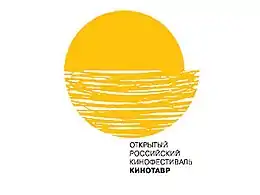Kinotavr
Kinotavr (Russian: Кинотавр[2]), also known as the Sochi Open Russian Film Festival is an open film festival held in the resort city of Sochi, Russia annually in June since 1991, until it was cancelled in the wake of the 2022 Russian invasion of Ukraine.[3][4] Alexander Rodnyansky said: "This year the festival will not take place, it will be rescheduled for a period when we survive the current political events and can return to the cinema, including to understand what happened to the country and to all of us."[3]
 New festival logo from 2006[1] | |
| Location | Sochi, Russia |
|---|---|
| Language | Russian |
| Website | http://www.kinotavr.ru/en/ |
From 1994 to 2005 the festival consisted of two parts: the Open Russian Film Festival (ORFF) and the International Film Festival (IFF).[5] As of 2008 it was the largest national film festival in Russia.[6] There is a second film festival, known as Sochi International Film Festival and Awards.[7]
The word Kinotavr is a portmanteau (in Russian) of "Cinema" and "...taur" (as in Centaur or Minotaur).
History
The history of the festival can be traced back to the Soviet era when in 1990 Mark Rudinstein organized his “Festival of Un-bought Cinema” in Podolsk, Moscow Region. It was an attempt to support national film production and distribution in the time of social, political and economic turmoil in the USSR when film financing (up until then provided by the state) was reduced and national distribution network had collapsed.[8] In 1991 the festival got its nowadays name “Kinotavr” and was relocated to Sochi. In 1994 it already consisted of two parts: the Open Russian Film Festival (ORFF) and the International Film Festival (IFF), registered with the International Federation of Associations of Film Producers (FIAPF). In 2005 “Kinotavr” brand was bought by Alexander Rodnyansky, the management switched its focus onto national market and IFF part was stopped.[5] Kinotavr now was aimed at becoming “a powerful mechanism in the development of a film industry”[9] in Russia and then also continued to make "emphasis on international promotion of Russian product”.[10] That change also gave the festival permanent programmer Sitora Alieva an opportunity to "play down the rivalry between Kinotavr and the Moscow Film Festival, also held in June".[11]
Awards
- The Grand Prize
- Best Director
- Best Debut
- Best Actor
- Best Actress
- Best Screenplay is called the "Grigory Gorin Award for the Best Screenplay"
- Best Music is called the "Tariverdiev Prize for the Best Music"
- The prize of the contest "Kinotavr: Short Film"
Over the history the following prizes have also been awarded:
- The Grand Prize (Second Prize) for the second best entry
- Special Prize of the Jury
- "Diamond Rose" prize
- Prize of the Guild of Russian Film Producers, for the best producer's project
- Prize of the Guild of Russian Film Scholars and Film Critics
- Prize of the Festival's Presidential Council
- FIPRESCI Prize, by Fédération Internationale de la Presse Cinématographique (FIPRESCI)
- FIPRESCI Prize - Special Mention
Winners
Grand Prize
- 1990 – Revenge, dir. Yermek Shinarbayev)[12]
- 1991 – Sons of Bitches (Сукины дети, dir. Leonid Filatov)
- 1992 – The Sun of the Sleepless (Солнце неспящих, dir. Temur Babluani)
- 1993 – Encore, Once More Encore! (Анкор, ещё анкор!, dir. Pyotr Todorovsky)
- 1994 – Little Angel, Make Me Happy (Ангелочек, сделай радость, Angelochek sdelay radost, dir. Uzmaan Saparov)[13]
- 1995 – Peculiarities of the National Hunt (Особенности национальной охоты, dir. Aleksandr Rogozhkin)
- 1996 – Prisoner of the Mountains (Кавказский пленник, dir. Sergei Bodrov)
- 1997 – Brother (Брат, dir. Aleksei Balabanov)
- 1998 – Time of the dancer (Время танцора, dir. Aleksandr Rogozhkin)
- 2000 – Luna Papa (Лунный папа, dir. Bakhtyar Khudojnazarov)
- 2001 – Tender Age (Нежный возраст, dir. Sergei Solovyov)
- 2002 – War (Война, dir. Bakhtyar Khudojnazarov)
- 2003 – Old Women (Старухи, dir. Gennadi Sidorov)
- 2004 – A Driver for Vera (Водитель для Веры, dir. Pavel Chukhray)
- 2005 – Poor Relatives (Бедные родственники, dir. Pavel Lungin)
- 2006 – Playing the Victim (Изображая жертву, dir. Kirill Serebrennikov)
- 2007 – Simple Things (Простые вещи, dir. Alexei Popogrebski)
- 2008 – Pal/Secam (dir. Dmitry Povolotsky)
- 2009 – Wolfy (Волчок, dir. Vassily Sigarev)
- 2010 – Truce (Перемирие, dir. Svetlana Proskurina)
- 2011 – Indifference (Безразличие, dir. Oleg Flyangolts)
- 2012 – I Will By Your Side (Я буду рядом, dir. Pavel Ruminov)
- 2013 – The Geographer Drank His Globe Away (Географ глобус пропил, dir. Alexander Veledinsky)
- 2014 – Test (Испытание, dir. Alexander Kott)
- 2015 – About Love (Про любовь, dir. Anna Melikian)
- 2016 – The Good Boy (Хороший мальчик, dir. Oksana Karas)
- 2017 – Arrhythmia (Аритми́я, dir. Boris Khlebnikov)
- 2018 – Core of the World (Сердце мира, dir. Natalia Meshchaninova)
- 2019 – The Bull (Бык, dir. Boris Akopov)[14]
- 2020 - Scarecrow (Пугало, dir. Dmitry Davydov)
- 2021 - Freeze Dance (Море волнуется раз, dir. Nikolay Khomeriki)
References and notes
- Leonova, Yevgeniya (19 April 2006). "Кинотавр" сократится вдвое. Nezavisimaya Gazeta (in Russian). Retrieved 2 March 2009.
- A pun on "Minotaur"
- "Alexander Rodnyansky announced the cancellation of Kinotavr this year - ePrimefeed". 24 March 2022.
- Official website, retrieved on 2018-05-14.
- "Кинофестиваль "Кинотавр". Досье".
- "Russia's biggest local film festival starts". Hollywood Reporter. 9 June 2008.
- Sochi International Film Festival and Awards, official website.
- "Kinotavr". kinotavr.ru.
- Birchenough, Tom (19 May 2005). "Kinotavr fest's focus is local pix".
- Kontavr puts accent on Russia, Variety
- Kinotavr fest’s focus is local pix, Variety
- "Sochi Open Russian Film Festival (1990)". IMDb. Retrieved 18 May 2018.
- Angelochek sdelay radost at IMDb
- "Kinotavr". www.kinotavr.ru.
External links
- Kinotavr official page in English.
_%D0%BD%D0%B0_VK_Fest_5_(cropped).jpg.webp)